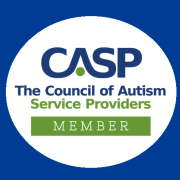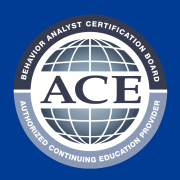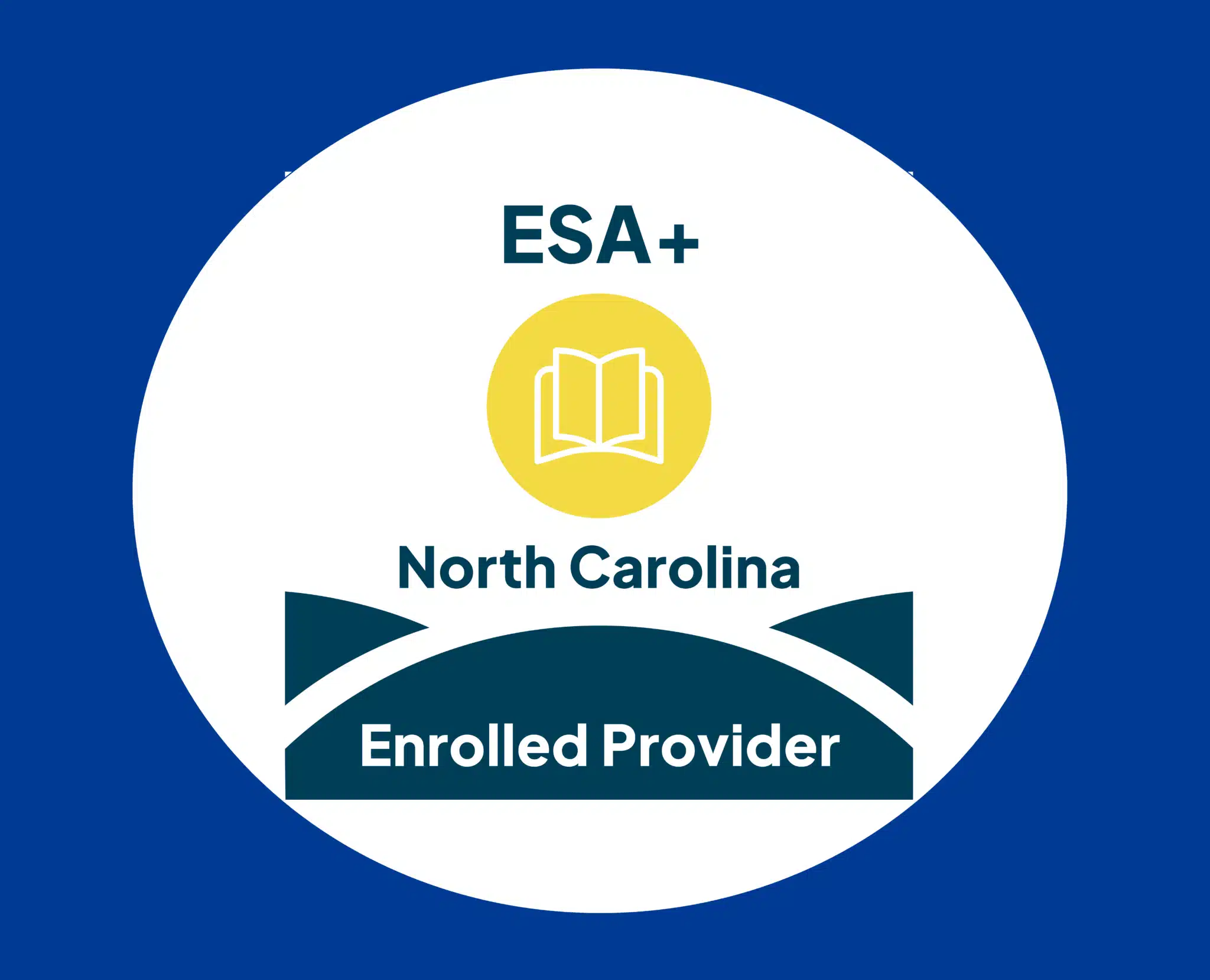Who Can Provide ABA Therapy?
Applied Behavior Analysis (ABA) therapy is an evidence-based approach often used to support, but is not limited to, autistic learners. It’s essential to understand who is qualified to provide ABA therapy to ensure your loved one receives the highest standard of care.
A Bridge to Achievement (ABtA) is solely dedicated to supporting the autism community, so it’s easy to see the credentials that are required to administer ABA therapy when looking at our team page. But ABtA is an anomaly – most clinical practices cater to individuals with a variety of diagnoses, and so the who’s who is typically less clear.
In this article, we’ll detail who can provide ABA therapy, along with an explanation of the various roles within an ABA therapy team, and share some essential tips for finding a qualified ABA provider for your learner.

Qualifications Required to Provide ABA Therapy
ABA therapy is done by Board Certified Behavior Analysts (BCBAs), with direct instruction given by Registered Behavior Technicians (RBTs). These clinicians must meet specific educational requirements, obtain relevant certifications, and engage in ongoing training to maintain their skills and knowledge.
Board Certified Behavior Analysts (BCBAs)
BCBAs are highly-trained professionals who require advanced education and practical experience in behavior analysis. At A Bridge to Achievement, our entire leadership and behavior analyst teams are BCBAs who are licensed to practice in North Carolina.
- Education: Must have a master’s degree or higher in behavior analysis, education, psychology, or a related field.
- Coursework: Completion of approved graduate-level coursework in behavior analysis.
- Fieldwork: Completion of a specific number of supervised fieldwork hours as mandated by the Behavior Analyst Certification Board (BACB).
- Certification Exam: Must pass the BCBA certification exam administered by the BACB.
- Compliance: Must comply with the BACB Professional and Ethical Compliance Code for Behavior Analysts, which includes principles such as responsibility to clients, integrity, and competence.
- Licensure: Must have Licensed Behavior Analyst (LBA) designation from the North Carolina Behavior Analyst Licensure Board (NCBALB) in addition to certification.
- Continuing Education: Must complete a specified number of continuing education units (CEUs) every certification cycle (typically every two years) to maintain certification.
- Supervision: Must stay updated with the latest research and developments in the field of behavior analysis.
Registered Behavior Technicians (RBTs)
RBTs play a crucial role in implementing ABA therapy and require foundational education and training. Numerous members of the ABtA administrative teams are RBTs.
- Education: Requires a minimum of a high school diploma or equivalent.
- Training: Completion of a 40-hour training program covering the principles of ABA, ethical considerations, and practical implementation.
- Certification Exam: Must pass the RBT certification exam administered by the BACB.
- Compliance: Must comply with the RBT Ethics Code, which includes guidelines on responsible conduct, maintaining client dignity, and ensuring quality of service.
- Ongoing Supervision: Require regular supervision by a BCBA, with a specific number of supervision hours required each month.
- Renewal: Must renew certification annually, including continued adherence to the RBT Ethics Code and ongoing competency assessments.

Roles & Responsibilities of ABA Practitioners
BCBAs and RBTs play distinct but complementary roles in the delivery of ABA therapy. Together, they form a cohesive team that ensures that ABA therapy is both scientifically grounded and practically applied, leading to optimal outcomes for individual learners.
Board Certified Behavior Analysts (BCBAs)
BCBAs are advanced practitioners who hold a master’s degree or higher in behavior analysis or a related field, and are certified by the Behavior Analyst Certification Board. Their primary responsibilities include designing, implementing, and overseeing behavior intervention plans.
BCBAs conduct comprehensive behavioral assessments to identify the needs and goals of the learners in their care, then develop tailored treatment plans based on these assessments. They are also responsible for analyzing data collected during therapy sessions to monitor progress and make necessary adjustments to the intervention strategies.
Furthermore, BCBAs provide training and supervision to RBTs and other support staff, ensuring that therapy is delivered effectively and consistently.
Registered Behavior Technicians (RBTs)
RBTs are paraprofessionals who work under the close supervision of BCBAs. They are responsible for the direct implementation of ABA therapy, following the specific treatment plans designed by the BCBAs.
RBTs engage with learners in one-on-one sessions, applying the behavior intervention techniques and strategies outlined in the treatment plans. Their duties include collecting data on learner behaviors, tracking progress, and reporting this information back to the supervising BCBA. This data is critical for BCBAs to make informed decisions about any necessary modifications to the treatment plan.
Additionally, RBTs often work with families and caregivers to help them understand and apply ABA strategies at home, contributing to the consistency and effectiveness of therapeutic treatment across different environments.
Other Medical Professionals
Oftentimes, learners with autism or other developmental diagnoses will engage in other types of therapy, such as speech and occupational therapy, and see other medical professionals. While these providers play crucial roles in an individual’s comprehensive care, they are not qualified to provide ABA therapy unless they have specific training and certification in behavior analysis.
- Speech-Language Pathologists (SLPs): Focus on communication and language development but do not typically implement ABA strategies.
- Occupational Therapists (OTs): Concentrate on improving daily living skills and motor functions rather than behavioral interventions.
- Clinical Psychologists: Specialize in mental health assessments and interventions but generally do not practice ABA without additional certification.
Choosing certified ABA providers ensures that your loved one receives therapy from professionals with specialized training and a deep understanding of behavior analysis principles. This specialized knowledge is crucial for developing effective, individualized treatment plans that promote meaningful progress.

Finding a Qualified ABA Provider
Finding a reputable practice with qualified clinicians who can provide ABA therapy is essential for ensuring effective treatment for learners with autism. Here are 12 criteria we suggest you consider when finding the right practice for your family.
-
Verify Credentials
Ensure the practice employs certified BCBAs who are licensed to practice in North Carolina. You can verify certification and licensure through the BACB’s certificant registry and NCBALB license verification portal.
-
Check Experience
Look for providers with substantial experience in ABA therapy – those same pages on the BACB and NCBALB websites include original certification and licensure dates.
-
Review Specialization
Some BCBAs and RBTs specialize in working with specific age groups or disorders. Ensure your provider has relevant experience. At ABtA, we engage autistic learners ages 2 through 21+ with comprehensive, resource-rich, one-on-one and small group therapeutic programming.
-
Assess Training
Ask about the provider’s commitment to continuing education and staying updated with the latest ABA practices.
-
Seek Referrals
Seek recommendations from healthcare professionals, educators, or other parents who have used ABA services.
-
Evaluate the Initial Consultation
A reputable provider should offer a thorough initial assessment to understand the learner’s needs and then provide a tailored treatment plan based on the assessment that is aligned with the family’s goals and values.
-
Observe Sessions
A good provider should allow you to observe therapy sessions or provide regular updates on progress. Observe how the provider interacts with clients and whether they use positive reinforcement techniques.
-
Check Ethical Standards
Ensure the provider follows the BACB Code of Ethics and RBT Ethics Code, as applicable. set by the BACB, which include principles of responsibility, integrity, and competence. Providers should prioritize client rights, including informed consent, confidentiality, and individual welfare. At A Bridge to Achievement, we practice neuro-affirming, assent-based ABA therapy.
-
Ask About Outcomes & Data
The provider should have a clear method for tracking progress and make decisions regarding the treatment plan based on data and client progress.
-
Inquire About Family Involvement
A reputable ABA provider should offer support for family members to ensure consistency and generalization of skills across settings. They should work collaboratively with you and other professionals involved in your child’s care. (At ABtA, we also offer the Balance Program – a parent training opportunity aimed at creating joy and balance in the home.)
-
Verify Availability & Accessibility
Ensure the provider can commit to regular and consistent sessions. Consider the provider’s location and availability to fit your schedule.
-
Check Cost & Insurance
Check if the provider accepts your insurance and what services are covered. Ensure you understand all costs involved and any potential additional fees.
Are you ready to get an autism diagnostic assessment for your loved one, or begin ABA therapy? Request services! Our phenomenal team of passionate, qualified providers stands ready to work with your learner! Support starts here.





